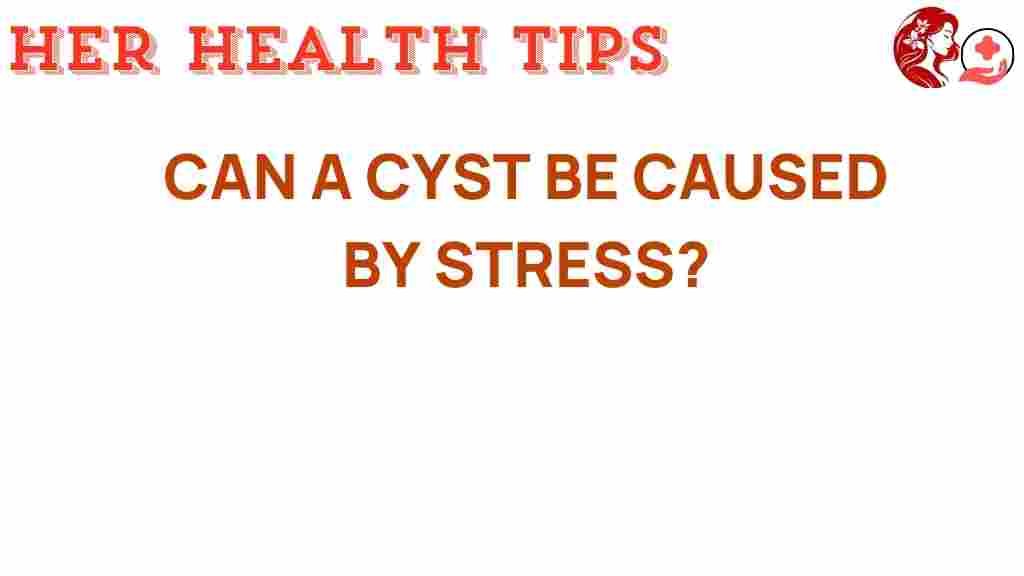Unraveling the Mystery: Can Stress Trigger Cyst Formation?
In today’s fast-paced world, stress has become a common experience for many individuals. From work pressures to personal challenges, stress can significantly impact our health and wellness. One intriguing question that arises is whether stress can trigger cyst formation in the body. Cysts, which are closed sacs filled with fluid or semi-solid material, can appear in various parts of the body, and understanding their connection to stress is essential for managing overall health.
This article will explore the relationship between stress, cysts, and various health aspects, including inflammation, anxiety, hormonal imbalance, and the body’s response to these factors. We will also provide lifestyle tips to mitigate stress and its potential effects on cyst formation.
The Link Between Stress and Cysts
To comprehend how stress might lead to cyst formation, it’s essential to evaluate the underlying mechanisms involved. Stress affects the body in various ways, which can contribute to the development of cysts:
- Hormonal Imbalance: Stress triggers the release of hormones like cortisol, which can disrupt the balance of other hormones in the body. This imbalance can lead to conditions that promote cyst formation.
- Inflammation: Chronic stress is known to increase inflammation in the body. Inflammation can create an environment conducive to cyst development.
- Anxiety Response: The body’s response to stress often involves heightened anxiety, which can exacerbate physical symptoms and lead to the formation of cysts.
Understanding Cyst Formation
Cysts can form in various tissues and organs, including the skin, ovaries, kidneys, and liver. While the exact causes of cysts can vary, several factors may contribute to their development:
- Genetics: Some individuals may be genetically predisposed to forming cysts.
- Infections: Certain infections can lead to the formation of cysts in affected areas.
- Blockages: Blocked ducts or glands can result in cyst formation.
Stress might not directly cause cysts, but it can exacerbate existing conditions or create an environment where cysts are more likely to develop.
How Stress Influences Cysts
Understanding how stress influences the body is crucial in exploring its potential link to cyst formation. Let’s delve deeper into the body’s response to stress:
1. The Stress Response
When faced with stress, the body activates its “fight or flight” response, resulting in various physiological changes:
- Increased Heart Rate: The heart pumps faster to prepare for physical action.
- Elevated Cortisol Levels: The adrenal glands release cortisol, which can affect various bodily functions.
- Altered Immune Response: Chronic stress can weaken the immune system, making the body more susceptible to infections that could lead to cyst formation.
2. Hormonal Changes
Stress can disrupt the delicate balance of hormones in the body:
- Estrogen Levels: Prolonged stress can lead to elevated estrogen levels, which may contribute to the formation of ovarian cysts.
- Thyroid Hormones: Stress can affect thyroid function, potentially leading to thyroid-related cysts.
3. Inflammation Connection
Stress-induced inflammation can have widespread effects on the body:
- Chronic Inflammation: Prolonged stress can lead to chronic inflammation, creating a fertile ground for cyst formation.
- Inflammatory Diseases: Conditions like polycystic ovary syndrome (PCOS) are linked to inflammation and stress.
Step-by-Step Process: Managing Stress for Better Health
To reduce the risk of cyst formation related to stress, consider implementing the following strategies into your lifestyle:
Step 1: Identify Stressors
Recognizing what causes stress in your life is the first step in managing it. Keep a journal to track your stress levels and identify patterns.
Step 2: Practice Mindfulness
Mindfulness techniques can help reduce stress and improve overall wellness:
- Meditation: Regular meditation can help calm the mind and reduce anxiety.
- Deep Breathing: Practicing deep breathing exercises can lower stress levels.
Step 3: Exercise Regularly
Physical activity is a powerful stress reliever:
- Cardiovascular Exercise: Activities like running, swimming, or cycling can boost endorphins and improve mood.
- Yoga: Yoga combines physical movement with mindfulness, reducing stress and promoting relaxation.
Step 4: Maintain a Balanced Diet
A nutritious diet supports overall health and wellness:
- Omega-3 Fatty Acids: Foods rich in omega-3s, like fish, can reduce inflammation.
- Antioxidant-Rich Foods: Fruits and vegetables can combat oxidative stress in the body.
Step 5: Seek Support
Talking to friends, family, or a mental health professional can provide relief from stress. Consider joining support groups or therapy sessions to share experiences and coping strategies.
Troubleshooting Tips for Stress Management
If you find yourself struggling with stress and its potential impact on your health, here are some troubleshooting tips:
- Set Realistic Goals: Break tasks into manageable steps to prevent feeling overwhelmed.
- Limit Caffeine and Alcohol: Both substances can increase anxiety and stress levels.
- Establish a Routine: Create a daily routine to provide structure and predictability.
- Prioritize Sleep: Ensure you get enough rest, as sleep is essential for stress recovery.
For more information on managing stress and improving health, check out this comprehensive guide.
Conclusion: The Path to Wellness
In conclusion, while stress may not directly cause cysts, its influence on hormonal balance, inflammation, and the body’s overall response can create conditions that facilitate cyst formation. By understanding the connection between stress and cysts, individuals can take proactive steps toward achieving better health and wellness.
Incorporating stress management techniques, maintaining a healthy lifestyle, and seeking support can significantly impact your physical and emotional well-being. Remember, prioritizing your health is an ongoing journey, and managing stress effectively is a crucial part of that process.
Stay informed, stay proactive, and embrace a lifestyle that promotes wellness, reducing the likelihood of stress-related health issues, including cyst formation.
This article is in the category Conditions and created by HerHealthTips Team
